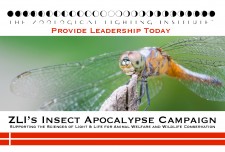Light Pollution is Driving the Insect Apocalypse: A New Study and Concern

NEW YORK, November 23, 2019 (Newswire.com) - This Thanksgiving, The Zoological Lighting Institute launches a new 'Insect Apocalypse Campaign' to stress links between hunger challenges and global insect conservation. A new research paper in the scientific journal BIOLOGICAL CONSERVATION. 'Light Pollution is a Driver of Insect Declines' (Owens, Perkin, Seymour et.al. 2019) raises heightened concerns over the impact of artificial light at night (ALAN) for environmental health. The Zoological Lighting Institute, a 501(c)(3) dedicated to the value and applicability of scientific research related to light and lighting for animal welfare and wildlife conservation, is using the campaign to demonstrate how important insects are for food security, and why natural light is vital for insects.
This latest article to sound the alarm over declining insect populations identifies light pollution as a significant factor and threat. After past studies emphasized that 40% of all insect species would go extinct within the next several decades, this most recent paper identifies artificial lighting as a major factor. 'Light Pollution is a Driver of Insect Declines' (Owens, Perkin, Seymour et.al. 2019) references over 200 independent studies to support its findings.
The paper recounts "numerous studies [demonstrating] the ways in which ALAN impacts nocturnal and diurnal insects through effects on the development, movement, foraging, reproduction, and predation risk" of insects. The authors emphasize that the challenge of artificial light is not simply a matter of concern for cities and suburbs, but for rural and protected areas as well. Artificial lighting follows humans wherever they go, and directly and significantly contributes to the loss of insects and biodiversity across the planet.
"This is an incredibly important paper and worthy of a dedicated Campaign," urges The Zoological Lighting Institute (ZLI) Director Dr. James Karl Fischer. "Insects are lynch-pins of the environment, and are central not only to wild food chains but also human food security. Insects can't survive under current levels of artificial lighting, and we can't survive without them. It is an easy matter to eliminate, reduce or change the ecologically devastating artificial lighting in and on our homes, schools, businesses if we want to, simply by turning off exterior lights and shading windows. But people have to want to do that, and be willing to explore alternatives to the functions those lights currently serve. By underscoring the issues of food security, ZLI hopes to make the extreme importance of artificial light challenges for the environment obvious to all."
For information on how to participate in the campaign, readers are urged to contact ZLI Directly. The charity is seeking grass-roots participation, financial board members and donations to pursue this work.
About The Zoological Lighting Institute:
A charitable 501(c)(3) with a unique mission to 'Support the Sciences of Light and Life through the Arts for Animal Welfare and Wildlife Conservation,' 'ZLI' provides funding to researchers while advocating for the application of data-driven science to improve environmental and animal care decisions related to light and lighting. ZLI's Insect Apocalypse Campaign links entomological research to world hunger initiatives and is currently pursuing documentary, educational and design projects to support this research.
Please visit www.zoolighting.org/donate to take advantage of Matching Gift and Donor Advisory Fund opportunities. Animal advocates can also contribute to ZLI as a Member or Campaign Committee Leader https://zoolighting.org/campaigns.
Read the paper "LIGHT POLLUTION IS A DRIVER OF THE INSECT APOCALYPSE: A NEW STUDY AND CONCERN" here:
https://papers.ssrn.com/sol3/papers.cfm?abstract_id=3378835
Contact: Brett Seymoure Ph.D., ZLI PhotoSciences Director
Phone: 01.212.317.2927
E-mail: InsectApocalypse@zoolighting.org
#####
Source: The Zoological Lighting Institute